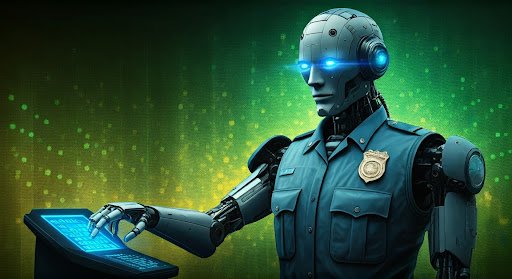The impact of artificially intelligence on law enforcement is explored. This Article examines how Ai is changing police work, reduce bias and enhance public safety.
How AI Is Changing Police Work
The Rise of AI In Policing
Specific example of AI tools being used by police department, like facial recantation, predictive policing software, and crime analysis platforms.
Police can easily recognized cyber criminal by use of facial recantation and also predict criminal activities by using predictive policing software and crime analysis platforms. Also improve response time, work efficiency, resource allocation and much more.
Table of Contents
Ai for Enhanced Public Safety
Police also used AI in crime prevention, such as analysing crime patterns to predict hotspots. Because prevention is more important in cybercrime.
And we want to see that how AI is Changing police work and can help in identifying and apprehending criminals more effectively through facial recognition and license plate readers.
Addressing Bias and Accountability
In decision making processes the potentials of Ai in policing also important, such as bias amplification and lack of transparency in decision making processes. Also emphasizing the importance of AI-powered policing ethical guidelines and human oversight to reduce bias in AI algorithms and maintain ongoing efforts to ensure fairness and accountability in law enforcement agencies.
Real World Examples and Case Studies
Real life example of how positively impacted police work and citing specific case where it led to successful investigation or reduced crime rates. Police also faced challenges in implementing Ai technologies. The police also thing about emerging trends like Ai power body cameras and autonomous police vehicles.
Read Also
- A Comprehensive Study of Cyber Crimes Against Women in India
- Bank Fraud: Bank Employees Big Fraud, Still Going on! | Scammers’ Warning
- Cyber Fraud: Online Fraud From Abroad, Horrific Report by Home Minister | Cyber Security
- Internet Safety for Youth.| Cyber Security Awareness
- Cyber Crime: Why Should Youth Be Worried?
Ethical Consideration and Future Prospects
The ethical considerations surrounding is more important the use of Ai in policing such as privacy concerns, potential for misuse and the need for robust oversight mechanisms. The public trust and transparency is more important in Ai driven policing.
Conclusion
Ai’s advanced data analytics and facial recognition technology enable officers to identify suspects quickly and accurately and improve case resolution. So we need to understand how Ai is changing the way police work. AI helps us by predicting crimes and analyzing them more efficiently. It reduces manual workload and helps in resolving cases very quickly.
Overall, Ai empowers law enforcement agencies to work more effectively and efficiently, keeping up with the ongoing developments and challenges. AI has a lot to play in building a safer society. Therefore, by enhancing the capabilities of police forces by using AI properly, it is possible to reduce crime from society to a great extent.
For More News Please visit CyberCrimesDaily.com
You Can Also Visit our YouTube Chanel
How will AI change policing?
Artificial intelligence (AI) has the potential to enable predictive policing systems that aim to equip law enforcement agencies with the skills to do their job.
What will AI be able to do in 2025?
Through reasoning and learning, agentic AI will be able to make decisions to achieve business goals with minimal human intervention.


1 thought on “How AI Is Changing Police Work 2025”